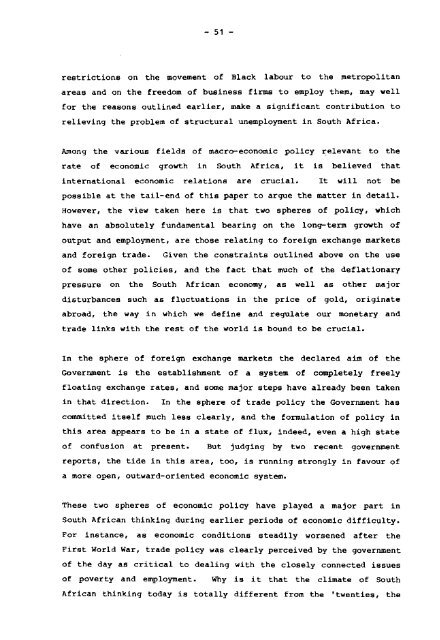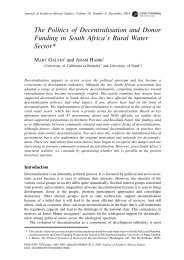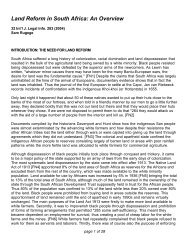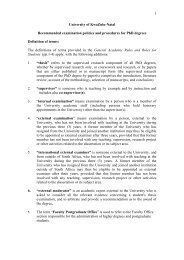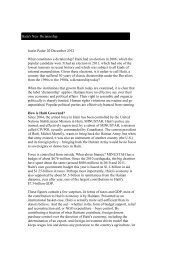Bell, Trevor : Unemployment in South Africa
Bell, Trevor : Unemployment in South Africa
Bell, Trevor : Unemployment in South Africa
Create successful ePaper yourself
Turn your PDF publications into a flip-book with our unique Google optimized e-Paper software.
estrictions on the movement of Black labour to the metropolitan<br />
areas and on the freedom of bus<strong>in</strong>ess firms to employ them, may well<br />
for the reasons outl<strong>in</strong>ed earlier, make a significant contribution to<br />
reliev<strong>in</strong>g the problem of structural unemployment <strong>in</strong> <strong>South</strong> <strong>Africa</strong>.<br />
Among the various fields of macro-economic policy relevant to the<br />
rate of economic grovth <strong>in</strong> <strong>South</strong> <strong>Africa</strong>, it is believed that<br />
<strong>in</strong>ternational economic relations are crucial. It will not be<br />
possible at the tail-end of this paper to argue the matter <strong>in</strong> detail.<br />
However, the view taken here is that two spheres of policy, which<br />
have an absolutely fundamental bear<strong>in</strong>q on the long-term growth of<br />
output and employment, are those relat<strong>in</strong>q to foreign exchange markets<br />
and foreign trade. Given the constra<strong>in</strong>ts outl<strong>in</strong>ed above on the use<br />
of some other policies, and the fact that much of the deflationary<br />
pressure on the <strong>South</strong> <strong>Africa</strong>n economy, as well as other major<br />
disturbances such as fluctuations <strong>in</strong> the price of gold, orig<strong>in</strong>ate<br />
abroad, the way <strong>in</strong> which we def<strong>in</strong>e and regulate our monetary and<br />
trade l<strong>in</strong>ks with the rest of the world is bound to be crucial.<br />
In the sphere of foreign exchange markets the declared aim of the<br />
Government is the establishment of a system of completely freely<br />
float<strong>in</strong>g exchange rates, and some major steps have already been taken<br />
<strong>in</strong> that direction. In the sphere of trade policy the Government has<br />
committed itself much less clearly, and the formulation of policy <strong>in</strong><br />
this area appears to be <strong>in</strong> a state of flux, <strong>in</strong>deed, even a high state<br />
of confusion at present. But judg<strong>in</strong>g by two recent government<br />
reports, the tide <strong>in</strong> this area, too, is runn<strong>in</strong>g strongly <strong>in</strong> favour of<br />
a more open, outward-oriented economic system.<br />
These two spheres of economic policy have played a major part <strong>in</strong><br />
<strong>South</strong> <strong>Africa</strong>n th<strong>in</strong>k<strong>in</strong>g dur<strong>in</strong>g earlier periods of economic difficvlty.<br />
For <strong>in</strong>stance, as economic conditions steadily worsened after the<br />
First World War, trade policy was clearly perceived by the government<br />
of the day as critical to deal<strong>in</strong>g with the closely connected issues<br />
of poverty and employment. Why is it that the climate of <strong>South</strong><br />
<strong>Africa</strong>n th<strong>in</strong>k<strong>in</strong>g today is totally different from the 'twenties, the


